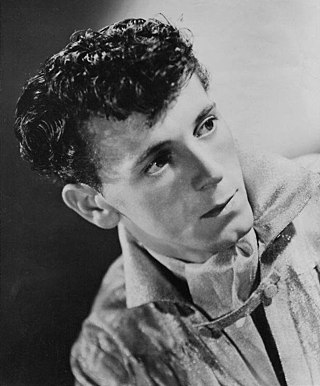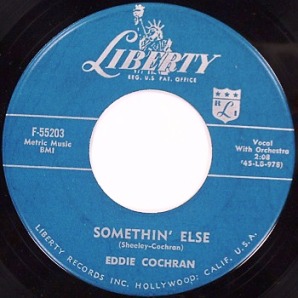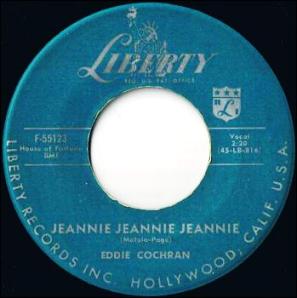
Ray Edward Cochran, known professionally as Eddie Cochran, was an American rock and roll musician. His songs, such as "Twenty Flight Rock", "Summertime Blues", "C'mon Everybody" and "Somethin' Else", captured teenage frustration and desire in the mid-1950s and early 1960s. Cochran experimented with multitrack recording, distortion techniques, and overdubbing, even on his earliest singles. Cochran played the guitar, piano, bass, and drums. His image as a sharply dressed and attractive young man with a rebellious attitude epitomized the stance of the 1950s rocker, and in death, Cochran achieved iconic status.

Vincent Eugene Craddock, known as Gene Vincent, was an American rock and roll musician who pioneered the style of rockabilly. His 1956 top ten hit with his backing band the Blue Caps, "Be-Bop-a-Lula", is considered a significant early example of rockabilly. His chart career was brief, especially in his home country of the US, where he notched three top 40 hits in 1956 and 1957, and never charted in the top 100 again. In the UK, he was a somewhat bigger star, racking up eight top 40 hits from 1956 to 1961.

"Summertime Blues" is a song co-written and recorded by the American rock artist Eddie Cochran. It was written by Cochran and his manager Jerry Capehart. Originally a single B-side, it was released in August 1958 and peaked at number 8 on the Billboard Hot 100 on September 29, 1958, and number 18 on the UK Singles Chart. It has been covered by many artists, including being a number-one hit for country music artist Alan Jackson, and scoring notable hits in versions by Blue Cheer, the Who and Brian Setzer, the last of whom recorded his version for the 1987 film La Bamba, in which he portrayed Cochran.

"Somethin' Else" is a song by the rockabilly musician Eddie Cochran, co-written by his girlfriend Sharon Sheeley and his elder brother Bob Cochran, and released in 1959. It has been covered by a wide range of artists, including Johnny Hallyday, Led Zeppelin, and the Sex Pistols.

Smokin' is the fifth studio album by English rock band Humble Pie, released in 1972 by A&M Records. It was the band's international commercial breakthrough, peaking at number 6 on the US Billboard 200 album chart, and hit number 20 in the UK and number 9 in Australia.

"I'll See You in My Dreams" is a popular song and jazz standard, composed by Isham Jones, with lyrics by Gus Kahn, and published in 1924. It was recorded on December 4 that year, by Isham Jones conducting Ray Miller's Orchestra. Released on Brunswick Records, it charted for 16 weeks during 1925, spending seven weeks at number 1 in the United States. Other popular versions in 1925 were by Marion Harris; Paul Whiteman; Ford & Glenn; and Lewis James; with three of these four reaching the Top 10.
"Money Honey" is a song written by Jesse Stone, which was released in September 1953 as the first single by Clyde McPhatter backed for the first time by the newly formed Drifters. McPhatter's voice, but not his name, had become well known when he was the lead singer for Billy Ward and the Dominoes. The song was an immediate hit and remained on the rhythm and blues chart for 23 weeks, peaking at number 1. Rolling Stone magazine ranked it number 252 on its list of the 500 Greatest Songs of All Time. The recording was reported to have sold more than two million copies by 1968.
Jerry Neil Capehart was an American songwriter and music manager. Capehart co-wrote the songs "Summertime Blues" and "C'mon Everybody" with Eddie Cochran, whom he also managed. One of his most-recorded songs, "Turn Around, Look at Me," was a chart hit for Glen Campbell, the Lettermen, and the Vogues.

"C'mon Everybody" is a 1958 song by Eddie Cochran and Jerry Capehart, originally released as a B-side.
"That's My Desire" is a 1931 popular song with music by Helmy Kresa and lyrics by Carroll Loveday.
"Hallelujah I Love Her So" is a single by American musician Ray Charles. The rhythm and blues song was written and released by Charles in 1956 on the Atlantic label, and in 1957 it was included on his self-titled debut LP, also released on Atlantic. The song peaked at number five on the Billboard R&B chart. It is loosely based on 'Get It Over Baby' by Ike Turner (1953).

"Cut Across Shorty" is a song written by Marijohn Wilkin and Wayne P. Walker, originally released and made popular by Eddie Cochran. It was the b-side of his number 1 UK hit "Three Steps To Heaven" and the last song he ever recorded.

Singin' to My Baby is the only album by Eddie Cochran, released on Liberty Records in mono in November 1957. The catalogue number was LRP 3061. It was the only album Eddie Cochran released during his short lifetime.

Never to Be Forgotten is the third album by Eddie Cochran and the second album posthumously released in the US after Cochran's death in 1960.

"Weekend" is a song recorded by Eddie Cochran. The song was written by Bill and Doree Post and recorded in April 1959.

"Jeannie Jeannie Jeannie" is a song by Eddie Cochran recorded and released as a single in January 1958 on Liberty Records 55123. It was a minor hit for Cochran and stalled at number 94 on the Billboard charts. "Jeannie, Jeannie, Jeannie" was posthumously released in the United Kingdom in 1961 on the London Records label and rose to number 31. Later versions are most commonly known as "Jeanie, Jeanie, Jeanie". The song was first written as "Johnny, Johnny, Johnny" for The Georgettes, but they never recorded it.

"Drive In Show" is a song originally performed by Eddie Cochran and released on single by Liberty Records in July 1957. "Drive In Show" backed with "Am I Blue" rose to number 82 on the Billboard charts.
"Sittin' in the Balcony" is a song written and performed by John D. Loudermilk under his artist name Johnny Dee. It was released in January 1957 on the Colonial Records label. Eddie Cochran had a Top 20 hit in the U.S. with his recording on Liberty Records in 1957.

"My Way" is a song co-written and recorded by Eddie Cochran. It was recorded in January 1959 and released posthumously as a single on Liberty Records in April 1963. In the UK the single reached number 23 on the charts.

"Sweetie Pie" is a song written by Eddie Cochran, Jerry Capehart, and Johnny Russell and recorded by Eddie Cochran. It was recorded in 1957 and released posthumously as a single on Liberty F-55278 in August 1960. In the UK the single rose to number 38 on the charts. The U.S. release did not chart. The flip side, "Lonely", reached number 41 on the UK singles chart. Keld Heich has recorded the song in 2010.















